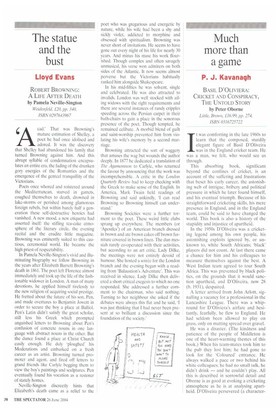The statue and the bust
Lloyd Evans
ROBERT BROWNING: A LIFE AFTER DEATH by Pamela Neville-Sington Weidenfeld. E20, pp. 340, ISBN 0297643967
cad.' That was Brovvning's mature estimation of Shelley, a poet he had once idolised and adored. It was the discovery that Shelley had abandoned his family that turned Browning against him. And this abrupt syllable of condemnation encapsulates an entire era, the fading of the drunken gory energies of the Romantics and the emergence of the genteel tranquillity of the Victorians.
A
Poets once whored and roistered around the Mediterranean, starved in garrets, coughed themselves to death, drowned in lake-storms or perished among glamorous foreign rebels, but within barely half a generation these self-destructive heroics had vanished. A new mood, a new etiquette had asserted itself: the stifling tea-cake atmosphere of the literary circle, the evening recital and the erudite little magazine. Browning was eminently suited to this cautious, ceremonial world. He became the high priest of respectability.
In Pamela Neville-Sington's vivid and illuminating biography we follow Browning in the years after Elizabeth Barrett Browning's death in 1861. The poet left Florence almost immediately and took up the life of the fashionable widower in London. A man of many devotions, he applied himself tirelessly to the new religion of acquiring social prestige. He fretted about the future of his son, Pen, and made overtures to Benjamin Jewett in order to secure the boy a place at Balliol. Pen's Latin didn't satisfy the great scholar, still less his Greek which prompted anguished letters to Browning about Pen's confusion of concrete nouns in one language with abstract nouns in the other. But the dunce found a place at Christ Church easily enough. He duly 'ploughed' his Moderations and embarked on a fresh career as an artist. Browning turned promoter and agent, and fired off letters to grand friends like Carlyle begging them to view the boy's paintings and sculptures. Pen eventually found his vocation as a restorer of stately homes.
Neville-Sington discreetly hints that Elizabeth's death came as a relief to the poet who was gregarious and energetic by nature, while his wife had been a shy and sickly violet, addicted to morphine and obsessed with spiritualism. Browning was never short of invitations. He seems to have gone out every night of his life for nearly 30 years. And minus his muse his work flourished. Though complex and often savagely unmusical, his verse won admirers on both sides of the Atlantic. It now seems almost perverse but the Victorians habitually ranked him alongside Shakespeare.
In his mid-fifties he was solvent, single and celebrated. He was also attracted to invalids. London was well stocked with ailing widows with the right requirements and there are several instances of randy cripples speeding across the Persian carpet in their bath-chairs to gain a place in the sonorous presence of the poet. Though tempted, he remained celibate. A morbid blend of guilt and saint-worship prevented him from violating his wife's memory by a second marriage.
Browning attracted the sort of waggery that amuses the wag but wounds the author deeply. In 1877 he dedicated a translation of The Agamemnon to Carlyle, who returned the favour by announcing that the work was incomprehensible. A critic in the London Quarterly Review had to keep checking with the Greek to make sense of the English. In America, Mark Twain held readings of Browning and said unkindly, 'I can read Browning so Browning himself can understand.'
Browning Societies were a further torment to the poet. These weird little clubs sprang up everywhere. The members (or 'Apostles') of an American branch dressed in brown and ate brown cakes off brown furniture covered in brown linen. The dun messiah rarely co-operated with their activities, but according to an art critic, Lady Mike, the meetings were not entirely devoid of humour. She hosted a soiree for the London branch and the evening began with a reading from Balaustion's Adventure'. This was received in silence. Lady Dilke then delivered a short critical exegesis to which no one responded. She addressed a further comment to the chairman, who said nothing. Turning to her neighbour she asked if the debates were always this flat and he said, 'I was just thinking that I had never been present at so brilliant a discussion since the foundation of the society.'


































































 Previous page
Previous page